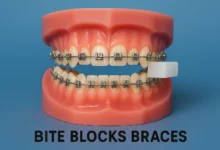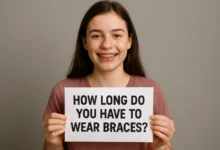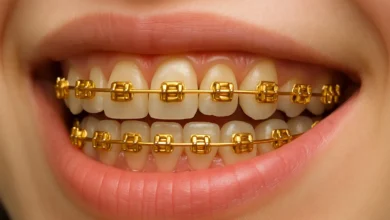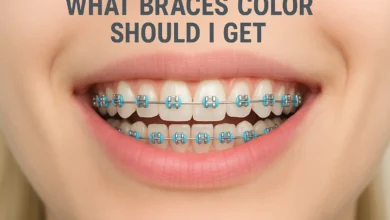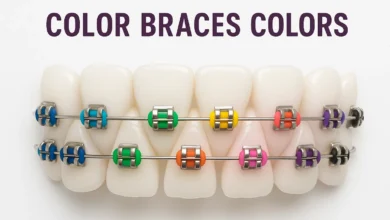Transparent Braces vs Metal – What’s Best for Teens and Adults

Transparent Braces vs Metal: Which One Is Right for You?
Introduction
Considering orthodontic treatment, you must have seen the two commonly used types: transparent braces vs metal. Regardless of whether you’re a teenager or grown up, or a guardian of a child, knowing the merits and demerits of each option will help you choose the right treatment as per your routine, finances and smile aspirations.
In this guide, we will outline a comparison of transparent braces and metal braces on all parameters including presence, comfort, price, durability, and effectiveness to help you make a well-informed choice setting no restrictions on your preferences.
1. What Are Metal Braces?

Metal braces represent the most conventional orthodontic solution which people use the most. The orthodontic system includes stainless steel brackets and archwires and elastic bands which work together to provide controlled pressure that moves teeth into proper alignment.
Key Features:
Visible metal brackets
Highly effective for all types of misalignment
Affordable and durable
Colorful elastic bands for personalization (popular with kids and teens)
Despite their visibility, metal braces remain a top choice for their proven success across decades.
2. What Are Transparent Braces?

The clear braces system functions similarly to traditional metal braces by using clear or tooth-colored brackets that blend with your natural tooth color. The clear design of these braces attracts older teens and adults because they stay discreet.
Key Features:
Tooth-colored or clear ceramic brackets
Less visible than metal braces
Can treat the same conditions as metal braces
Slightly more fragile and often more expensive
The first step in choosing between transparent braces and metal braces requires knowledge of these two types.
3. Transparent Braces vs Metal: Quick Comparison Chart
| Feature | Transparent Braces | Metal Braces |
|---|---|---|
| Appearance | Less visible, tooth-colored | Highly visible, metallic |
| Cost | $4,000 – $8,000 | $3,000 – $7,000 |
| Strength | Slightly fragile | Very durable |
| Staining Risk | Higher (clear bands) | Low |
| Treatment Time | Slightly longer | Often faster |
| Comfort | Smoother brackets | Can cause irritation |
| Ideal For | Teens, Adults | All ages |
| Customization | Limited | Color bands available |
4. Visibility: Which Is Less Noticeable?
One of the most common reasons people choose transparent braces over metal is aesthetic appeal.
Transparent Braces:
Blend with teeth
Less visible in photos and daily interactions
Preferred by adults and professionals
Metal Braces:
Obvious metal brackets
Often chosen by kids and teens who like colorful bands
So when comparing transparent braces vs metal, the clear winner in terms of discreet appearance is transparent braces.
5. Cost: Transparent Braces vs Metal Braces

Budget plays a huge role when deciding between transparent braces vs metal.
Average Cost in the U.S.:
Transparent Braces: $4,000 – $8,000
Metal Braces: $3,000 – $7,000
Why the difference? The use of advanced materials in clear braces along with precise placement methods leads to higher labor and material expenses.
💡 Tip: Ask your orthodontist about payment plans and whether insurance covers both options equally.
6. Comfort and Feel Inside the Mouth
Comfort is another factor in the transparent braces vs metal debate.
Transparent Braces:
Generally smoother and less abrasive
Ceramic brackets may feel bulkier
Metal Braces:
Smaller brackets, but metal edges can irritate cheeks and gums
Often cause initial discomfort after adjustments
If you’re sensitive to materials in your mouth, ceramic braces might offer a slight comfort advantage.
7. Treatment Duration and Effectiveness
Which type works faster or better?
Metal Braces:
Often recommended for complex cases
Apply more pressure with less risk of breakage
Shorter average treatment time
Transparent Braces:
Equally effective for mild to moderate cases
Can take slightly longer due to bracket fragility
Orthodontists choose metal brackets instead of clear ones for highly complex alignment problems because metal brackets provide better efficiency and durability.
8. Maintenance and Oral Hygiene
Good oral hygiene is essential regardless of which braces you choose—but there are differences.
Metal Braces:
Easier to clean due to smaller bracket size
Less staining risk
Transparent Braces:
Clear bands are prone to staining from coffee, tea, or curry
Require more careful brushing and flossing
In the transparent braces vs metal hygiene category, metal braces are slightly easier to maintain stain-free.
9. Durability and Risk of Breakage
Metal braces are made from durable stainless steel. Ceramic braces, while strong, are more brittle.
Ceramic Braces:
Can chip or break under high pressure
Not ideal for contact sports or intense clenching
Metal Braces:
Withstand more force
Ideal for active individuals
The durability of transparent braces versus metal braces makes metal braces more durable than transparent braces.
10. Staining and Discoloration
Ceramic braces are more prone to discoloration over time.
Clear Braces:
Elastic bands can turn yellow
Avoid foods like turmeric, coffee, red wine
Metal Braces:
No noticeable staining
Colored elastics can be replaced for fun variety
People who want to maintain their appearance over time need to understand this limitation when deciding between transparent braces and metal braces.
11. Age Suitability: Kids, Teens, and Adults
Which type is right for each age group?
Kids: Metal braces are usually the best option—cost-effective, durable, and customizable.
Teens: Both options are suitable; many prefer clear braces for school photos and confidence.
Adults: Transparent braces are ideal for maintaining a professional appearance.
Your age and lifestyle will determine which option between transparent braces and metal braces works best for you.
12. Transparent Braces vs Metal for Speech and Confidence

Braces can sometimes affect speech in the first few weeks.
Transparent Braces:
Slightly bulkier brackets can cause a temporary lisp
Boost confidence due to less visibility
Metal Braces:
May also cause temporary speech issues
More visible, which can affect self-esteem in adults
Patients who want to maintain social confidence and subtlety in their appearance tend to choose transparent braces as their preferred option.
13. Insurance and Financing Options
Most dental insurance plans cover both types of braces up to a certain amount.
Metal Braces:
Covered more widely under basic plans
Lower out-of-pocket cost
Transparent Braces:
May require higher-tier insurance
Can be financed via payment plans or FSAs/HSAs
Check with your insurance provider about specific coverage limits when deciding between transparent braces and metal braces.
14. Orthodontist Opinions: What the Experts Say
Dr. Amy Liu, Orthodontist, Dallas:
“Clear braces are great for image-conscious adults, but for younger patients or complex cases, metal braces remain the gold standard.”
Dr. Kevin Rhodes, Orthodontist, New York:
“The gap between transparent braces vs metal has narrowed. With today’s technology, both are effective—it comes down to lifestyle and patient preference.”
Experts agree that both types work well, but choosing between transparent braces vs metal depends on individual needs.
15. Final Verdict: Transparent Braces vs Metal
So, what’s the final verdict?
Choose Transparent Braces if:
You want a discreet look
You’re an adult or professional
You’re okay with more frequent cleaning
You have a mild-to-moderate case
Choose Metal Braces if:
You want a lower cost
You have a complex case
You’re a child or teen
You play sports or are very active
No matter which you choose, both will give you a straighter, healthier smile.
Braces and Headgear Before and After: What to Expect from Treatment
